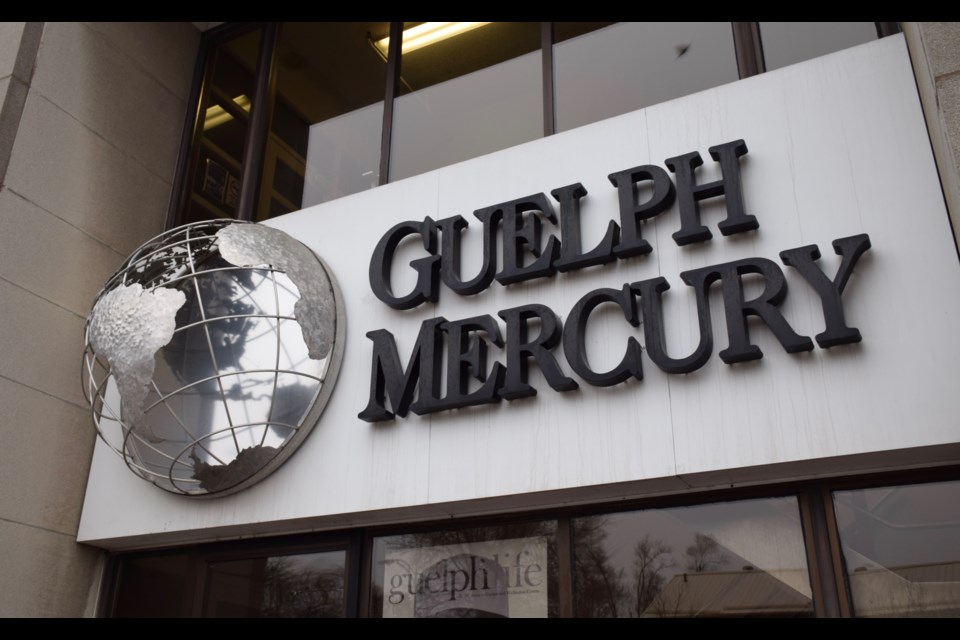On Feb. 18, 2015 a small group of local history buffs gathered in the main meeting room at 10 Carden St. to hear Phil Andrews, managing editor of the Guelph Mercury, talk about the newspaper’s long history.
The Mercury, he said, contrary to claims it started in 1867, was first printed in 1853 as part of a campaign to finance a railway between Guelph and Galt.
Andrews talked about the paper gaining a reputation early on for never missing a publication date except for one time when its horse-driven press failed to print because the horse died.
He had no way of predicting that within a year, on Monday, Jan. 25, he would be telling his reporters the Mercury was closing.
“I appreciate the company having informed me of Monday’s news on the preceding Friday,” said Andrews. “There was shock among my co-workers and in the community and I felt much better prepared to be the composed person that a lot of people needed me to be that day.”
News of the Mercury’s closure spread far and wide – making national headlines and dominating discussions on news programs such as TVO’s The Agenda with Steve Paikin and CBC’s At Issue with Peter Mansbridge.
“When I heard the news I couldn’t believe it,” said Guelph musician and CBC broadcaster, Craig Norris. “I really miss the Mercury. The fact that a city the size of Guelph doesn’t have a daily print newspaper is counterintuitive.”
Many in the community were in disbelief.
“We had reported so often on factories closing and people losing their jobs,” said Andrews. “Not to besmirch the integrity of the workers at the button factory but the Mercury wasn’t a button factory. It was an institution as old as Canada that touched so many people’s lives.”
Andrews had jumped at the opportunity to become managing editor of the Mercury in September 2005 after working as deputy managing editor for the New Brunswick Telegraph Journal
“The Mercury had already earned at that time a reputation as a punch-above-its-weight daily that took risks and was getting recognized for being innovative,” he said.
He was proud of the newspaper’s history and the many accomplishments under his watch.
In 2007, the Mercury won the Canadian Journalism Foundation Award of Excellence for Media Organizations in the Regional Organization category. It is the first recipient of the news award for small media organizations.
In 2010, it won a National Newspaper Award for the series the Hole Truth that explored issues related to the local and provincial gravel industry. It was the first time the paper received a National Newspaper Award.
There were also the numerous nominations and awards presented to newsroom staff.
“Another source of pride was graduating people on from the Mercury such as Daniel Dale who is doing really good journalism like fact-checking Donald Trump,” said Andrews. “We have graduated people on to the Globe and Mail, Canadian Press, National Post and The Hamilton Spectator.”
Ken Hood works at the Bookshelf and saw the contribution the Mercury made to promoting literacy and speaking truth to power.
“We should be concerned about what we are hearing from Trump and his advisors in the US,” said Hood. “They are describing the news media as the official opposition.”
The Mercury in recent years sent reporter Rob O’Flanagan to Lesotho to raise awareness of the Bracelet of Hope campaign and Scott Tracey to Rome to witness one of Guelph’s native sons, Thomas Collins, being installed as a cardinal.
“Those are things papers our size didn’t do,” said Andrews. “We did national-level reporting on important stories like the wrongful conviction of Steven Truscott and the Michael Sona case.”
For Guelph historian Susan Ratcliffe, the Mercury was invaluable for her research.
“I have two filing cabinets filled with clippings from the Mercury,” she said. “There are 10 filing cabinets of clippings at the library.”
Ratcliffe was among a large group of community members who showed up at the Mercury building on the last day of operation Fri. Jan 29, 2016 for a group hug to thank the reporters and staff for their service to the community.
Andrews said he saw the inevitability of the Mercury ending as a print publication and pitched ideas to Metroland that he believed would broaden their online presence but they were unreceptive.
“When there is smoke in the sky, you want to be the place people go to find out where the smoke is coming from,” he said. “The Mercury was that website in Guelph until it got unplugged. I think it is GuelphToday now that is that website. That is a value statement that I am sure is unsettling for Metroland because it is really hard and expensive to get it back.”
